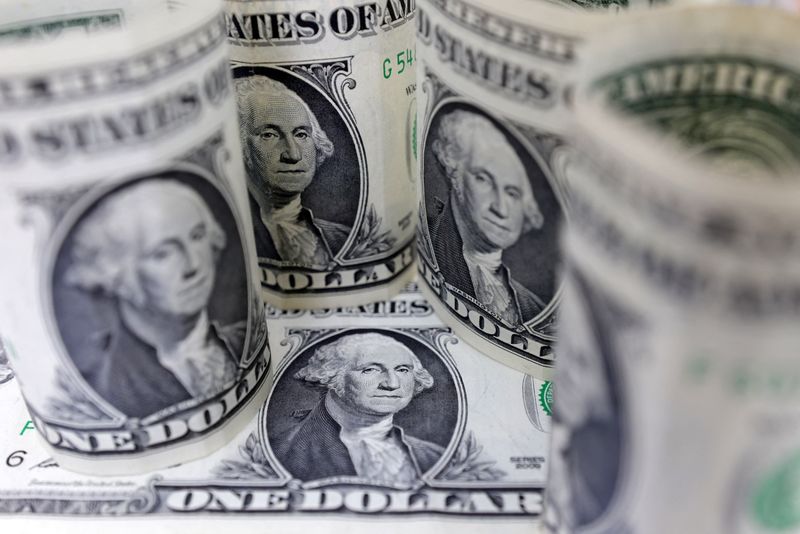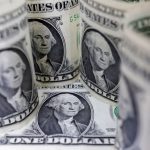SINGAPORE (Reuters) – The U.S. dollar edged down on Monday after a rally sparked by Friday’s strong U.S. jobs data and an escalation in the Middle East conflict.
The dollar’s gains followed a U.S. jobs report that showed the biggest jump in six months in September, a drop in the unemployment rate and solid wage rises, all pointing to a resilient economy and forcing markets to reduce pricing for Federal Reserve rate cuts.
Many of the factors that weighed on the greenback through the summer had reversed, analysts said, mentioning fading recession concerns and a price action suggesting the limits of pricing a dovish reaction function have been reached with this dataset.
“We cannot see a driver for rebuilding structural U.S. dollar short positions in the next couple of weeks,” said Francesco Pesole, a forex strategist at ING.
“Markets appear to have given up on another 50 bps cut, and inflation figures shouldn’t change that, and while the Middle East situation may not spiral further, the consensus seems to be that a material de-escalation isn’t likely for now,” he added.
The dollar index measure against major peers was down 0.05% at 102.48. It rose 0.5% on Friday to a seven-week high, logging more than 2% gains for the week, its biggest in two years. It was slightly above 100 early last week.
MUFG flagged that it is the second time the dollar index has fallen back towards support at the 100.00-level in recent years. On the last occasion in July 2023, the greenback index tested but failed to break below the 100.00-level before staging a strong rebound (+7.8%) in the following three months.
The yen fell marginally to hit 149.10 per dollar, its weakest level since Aug. 16, before paring losses to trade around 148.40. That came on top of a more than 4% decline last week, its biggest weekly percentage drop since early 2009.
“With rate cuts still being the default position, and when married to upbeat earnings expectations and China going hard on liquidity and fiscal, the equity bull case and the U.S. dollar get a shot in the arm,” said Chris Weston, head of research at Australian online broker Pepperstone.
“While geopolitical headlines and the possibility of an energy supply shock remain a continued threat to sentiment, those set long of risk haven’t heard anything significantly market moving through the weekend and head into the new trading week feeling pretty good about the prospect of further upside.”
In the Middle East, Israel bombed Hezbollah targets in Lebanon and the Gaza Strip on Sunday ahead of the one-year anniversary of the Oct. 7 attacks that sparked its war. Israel’s defence minister also declared all options were open for retaliation against arch-enemy Iran.
The euro stood at $1.0970, down 0.06%.
The yen’s underperformance has also to do with last week’s comments from new prime minister, Shigeru Ishiba, which stoked expectations that rate hikes in Japan are further away.
U.S. 10-year Treasury yields hit a new 2-month high at 3.9920%, in early London trade.
However, Barclays reckoned they have room to rise by about 20 bps even after accounting for the worst case of downside economic scenarios.
Markets expect the Federal Reserve to cut rates by just 25 bps in November, rather than 50 bps, following the jobs data. They now price in a 95% chance of a quarter point cut, up from 47% a week ago, and a 5% chance of no cut at all, according to CME’s FedWatch tool
“Dollar-yen will be staying around 145-149 in coming weeks due to lower expectations on an outsized cut by the Fed in November and dovish stance of Japan’s PM ahead of the general election on October 27 as long as the Middle East tensions remain subdued,” said Ryota Abe, economist at SMBC in Singapore.

Sterling was also flat around $1.3122, nursing last week’s 1.9% drop, its steepest fall since early 2023.
Bank of England Chief Economist Huw Pill said on Friday the central bank should move only gradually with cutting interest rates, a day after governor Andrew Bailey was quoted as saying the BoE might act more aggressively to lower borrowing costs.
To read the full article, Click Here

